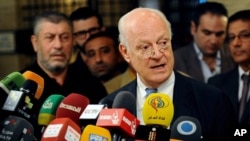The United Nations peace envoy to Syria said on Tuesday that Syrian officials had given him positive signals over a U.N. proposal for a local truce in the northern city of Aleppo, a main battleground in Syria's three-year-old war.
Speaking in a televised news conference in Damascus after meeting President Bashar al-Assad and the Syrian foreign minister, envoy Staffan de Mistura said the government's initial response to the proposal “was of interest and constructive interest.”
Assad had also been quoted on Monday as saying the proposal was worth studying.
De Mistura is pushing an initiative to create truces and improve aid access in defined local areas, starting in Aleppo, once Syria's main commercial hub.
“I believe that the proposal of the U.N. regarding one freeze... for Aleppo, is a concrete and realistic one,” Mistura said.
The state news agency said de Mistura and Foreign Minister Walid al-Moualem agreed to continue consultations on returning stability to Aleppo and easing the passage of humanitarian aid.
Control of Aleppo is divided between an array of rebel and pro-government forces. Neither side has managed to take a decisive advantage in more than two years of fighting.
In an interview with the British Broadcasting Corporation (BBC), de Mistura said a common threat posed by the Islamic State militant group may help push government and rebel forces toward local truces.
De Mistura told the BBC that Islamic State was “destabilizing everybody.”
Asked what incentive rebel and government fighters may have to accept local truces, de Mistura said: “There is one major new factor. What is that called? Daesh. ISIS. Terrorism.”
Islamic State is also known as ISIS and the Arabic acronym 'Daesh,' which its members consider derogatory.
The militants have seized swaths of territory in Iraq and Syria and are now the target of U.S.-led air strikes.
“Second... no one is actually winning [Syria's war],” de Mistura added. “You think that one side may be winning? The truth is no one is. And that's why we have an idea about how to push at least one major example, Aleppo.”
De Mistura acknowledged that, even if the U.N. plan went forward, it would only be an initial step in a conflict which has killed some 200,000 people and displaced millions.
“Saying having a peace plan would be ambitious and delusionary. But I do have, we do have, an action plan. And the action plan starts from the ground: stop the fighting, reduce the violence,” he said in the BBC interview.





